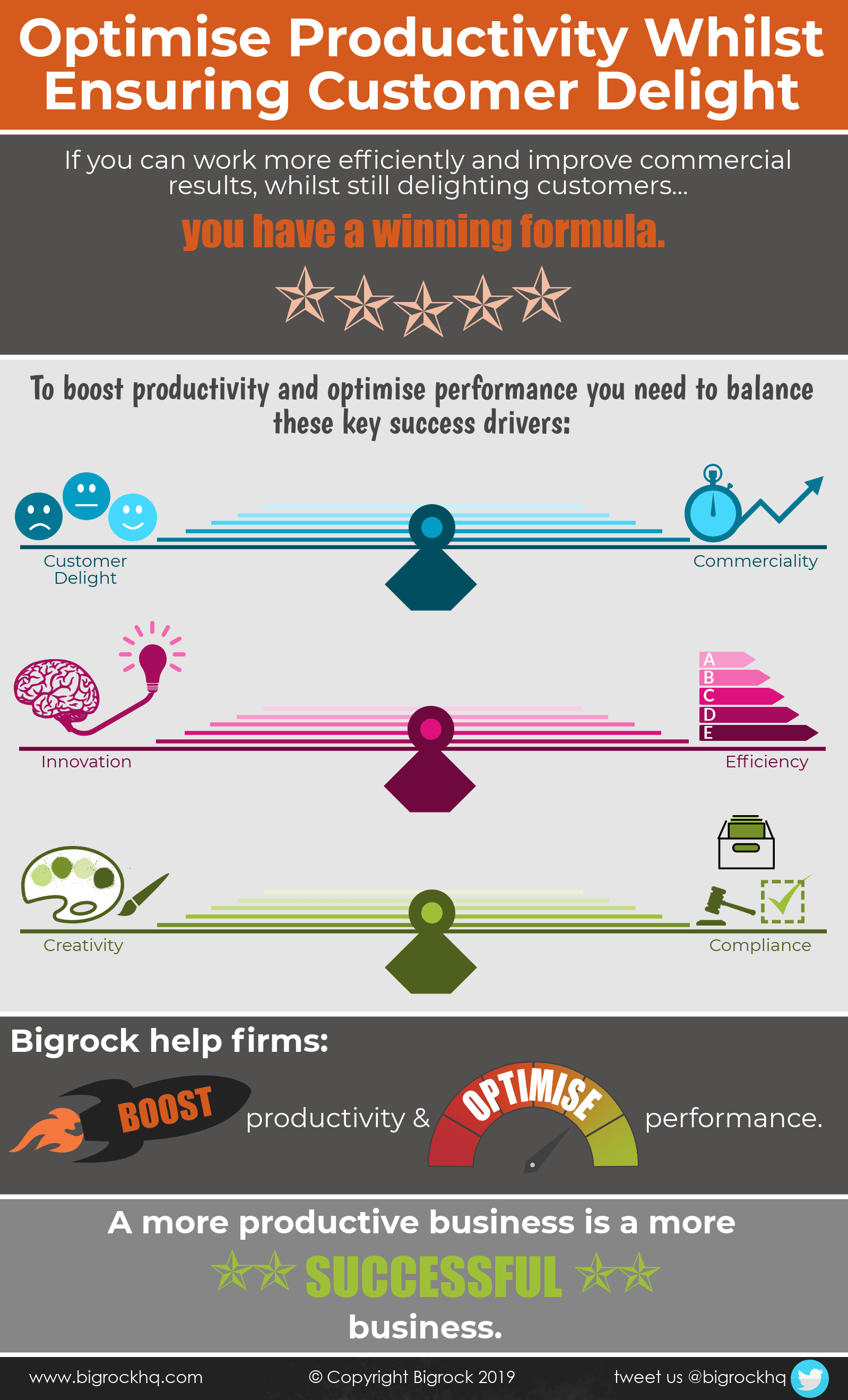We often speak to leaders who are looking to boost productivity, in a quest to improve bottom line results. These leaders are looking to do more and achieve more, in less time whilst spending less money. However, there are many competing factors that leaders need to weigh up in order to achieve this goal.
Here we look at just a few of the balancing acts business leaders need to get right in order to see a sustainable uplift in results.

First, let’s take customer delight and commerciality. If you can improve your commercials, whilst still delighting customers you have a winning formula.
Sounds simple, and in theory it is simple. For example, you may be able to reduce the cost of some sales by reducing the time your sales advisers spend with customers. If you can maintain or increase your sales results at the same time, this can create an immediate win for your bottom line.
However, this increase in profit can come at the expense of the customer experience. Sometimes customers welcome a more efficient sales process. At other times, something is lost from the sales process.
Your sales advisers might achieve the sale but might not have time to build the same level of relationship with the customer. Your advisers may have less time to answer questions or deal with customer queries, resulting in a poorer experience for the customer. Your advisers may miss the opportunity to sell in an additional service or gain a referral. The customer may be less likely to recommend your firm.
These losses are not always immediately noticeable on the bottom line but can have a significant effect on your long-term success. A delighted customer is a great asset to your business. Afterall, no business can succeed without its customers.
To optimise your success, you need to get the balance right between commerciality and delighting customers.
Next, let’s take innovation and efficiency.
One way to be more productive is look for more efficient ways of working. Is there a faster approach? Can a process have less steps? Can you manage your time more efficiently? In general, exploring ways to be more efficient will help boost overall productivity.
However, greater efficiency can often come at the expense of innovation. Innovation takes time. It takes trial and error. It requires the time to make mistakes.
If people feel under pressure to continually save time and make efficiencies, they may feel unable to take the time to develop new ideas.
Focusing on efficiencies at the expense of innovation can drive greater productivity in the short term, as team members focus on performing key tasks as quickly and effectively as possible.
However, in the long term, most businesses would not survive without innovation. Soon the competition would launch a great new service. Soon your current products would look outdated. Plus, in the current climate, with many organisations facing competition from both their traditional market places and digital disruptors, this is not a time to neglect innovation.
In the long term, you can’t be productive if you don’t innovate.
The most successful businesses addresses this particular balance, by seeing innovation as a way to drive efficiency. Rather than focusing on cutting time, get team members to think innovatively about current processes and approaches. Can innovation and efficiency come together in your business to drive greater productivity?
Finally, lets take creativity and compliance.
At Bigrock, we work with a lot of clients in highly regulated industries like financial services, where compliance is a business necessity.
There are certain things that need to be done in a certain way in order to comply with regulation and ensure the best outcome for customers. There are legal, financial and reputational consequences if things go wrong.
Firms rightly put in place processes to help team members do the right things in the right way and stay compliant. Even in other industries, with less regulation, most businesses will expect team members to follow particular processes so that teams can easily work together and ensure a consistent customer experience.
When this is taken too far, though, it can hamper creativity.
Just like innovation, creativity is key to long term success. The most successful sales people don’t just follow a process or adhere to a script, they add personality and flair to their conversations. The most successful marketing teams are empowered to utilise their creative skills to enrich their brand and make marketing materials come alive.
These team members’ creativity helps build stronger relationships with your customers.
Creativity can take your business from good to great to exceptional.
Creativity and compliance can be one of the hardest balancing acts to get right. Each organisation will have a different equilibrium to reflect their market, their level of regulation, how important consistency is to their business and how far their customers value personality.
Bigrock can help you explore how to get the balance right in your organisation to boost your productivity, optimise performance and drive even greater success. Learn more about our change programmes here.
